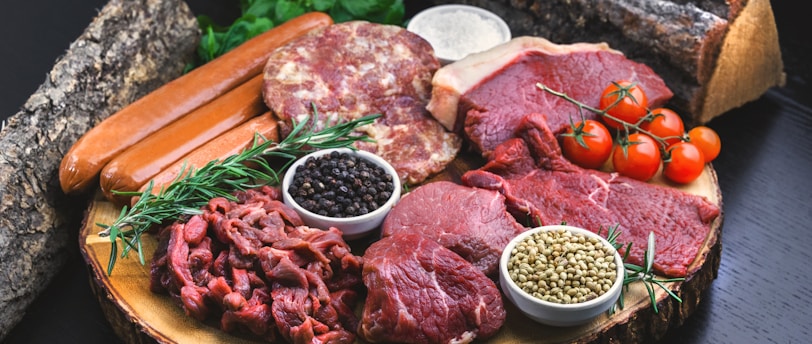High-Protein Diet Myths and What Science Really Says
High-protein diet myths debunked! Learn what science really says about protein, kidney health, fat gain, absorption limits, bone health, and plant-based proteins.
NUTRITION
Vitae List
8/19/20253 min read


High-Protein Diet Myths and What Science Really Says
Disclaimer: Some of the links in this article are Amazon Associates links. As an Amazon Associate, we earn from qualifying purchases at no extra cost to you.
High-protein diets have exploded in popularity over the past decade, with athletes, bodybuilders, and everyday health enthusiasts praising their benefits for weight management, muscle growth, and overall health. But with popularity comes misinformation—and unfortunately, many myths about high-protein diets still circulate today.
In this article, we’ll break down the most common myths surrounding high-protein diets and uncover what science really says about them.
Myth #1: Eating Too Much Protein Will Damage Your Kidneys
One of the most persistent myths is that a high-protein diet harms kidney health. While people with pre-existing kidney disease should monitor protein intake, healthy individuals have nothing to fear.
Research shows that for people with normal kidney function, even relatively high protein intakes (up to 2.2 grams per kilogram of body weight) do not cause kidney damage. In fact, the kidneys adapt to higher protein loads, and no evidence supports the idea that this is harmful for otherwise healthy people.
Science says: Unless you already have kidney disease, a high-protein diet is safe.
Myth #2: High-Protein Diets Make You Gain Fat
Many believe that eating more protein will automatically lead to fat gain, but the opposite is often true. Protein is more satiating than carbohydrates or fats, meaning it helps control hunger and reduce overall calorie intake.
Protein also has a higher thermic effect of food (TEF)—your body burns more calories digesting protein compared to other macronutrients. This makes protein one of the most effective nutrients for weight management.
Science says: High-protein diets support fat loss and muscle preservation when paired with balanced nutrition and exercise.
Myth #3: You Can Only Absorb 20–30 Grams of Protein per Meal
A common misconception is that the body can’t absorb more than 20–30 grams of protein in a single meal. While it’s true that muscle protein synthesis (MPS) maximizes around that amount, the body does much more with extra protein.
Protein beyond 30 grams can still be absorbed and used for various functions, including hormone production, enzyme activity, and tissue repair. Additionally, spreading protein intake throughout the day ensures more consistent stimulation of MPS.
Science says: You can absorb much more than 30 grams of protein at once—your body just uses the excess for other important roles.
Myth #4: High-Protein Diets Lead to Bone Loss
Decades ago, it was believed that protein increased calcium excretion, weakening bones. Modern research has flipped this myth on its head.
Studies now show that protein supports bone health by improving calcium absorption and promoting muscle mass, which protects against fractures. A diet higher in protein—especially when paired with strength training—actually strengthens bones rather than weakens them.
Science says: Protein is bone-friendly and may reduce the risk of osteoporosis later in life.
Myth #5: Plant-Based Proteins Aren’t Good Enough
Another common myth is that plant proteins are “incomplete” and therefore inferior to animal proteins. While many plant proteins may lack one or two essential amino acids, combining different sources (such as rice and beans) easily provides a complete amino acid profile.
Plant-based proteins also bring added benefits: fiber, antioxidants, and lower saturated fat content. Supplements like pea protein or soy protein isolate can also support muscle growth as effectively as whey when consumed in adequate amounts.
Science says: Plant proteins can absolutely support strength, performance, and health when consumed in variety and sufficient amounts.
Myth #6: More Protein Always Means More Muscle
Protein is essential for building muscle, but it’s not the only factor. Without resistance training, extra protein won’t magically turn into muscle—it may simply be used for energy or other bodily functions.
The optimal intake for muscle growth is around 1.6–2.2 grams of protein per kilogram of body weight per day, combined with strength training. Beyond this, additional protein offers diminishing returns.
Science says: Protein builds muscle only when paired with proper resistance training.
Tips for Following a High-Protein Diet Safely
Prioritize Whole Foods: Eggs, lean meats, fish, beans, lentils, and dairy provide quality protein and micronutrients.
Balance Macronutrients: Pair protein with healthy fats and carbohydrates for long-term sustainability.
Hydrate Well: Higher protein intake can slightly increase fluid needs, so keep water intake consistent.
Experiment with Timing: Spreading protein evenly across meals can optimize muscle protein synthesis.
Final Thoughts
High-protein diets are often misunderstood, but science paints a much clearer picture: they’re safe, effective, and beneficial for muscle growth, weight management, and long-term health when balanced with other nutrients. The key is choosing quality sources, eating in moderation, and pairing your protein intake with exercise for the best results.
Don’t let myths hold you back—protein is one of the most powerful tools you can add to your diet to feel stronger, healthier, and more energized every day.
